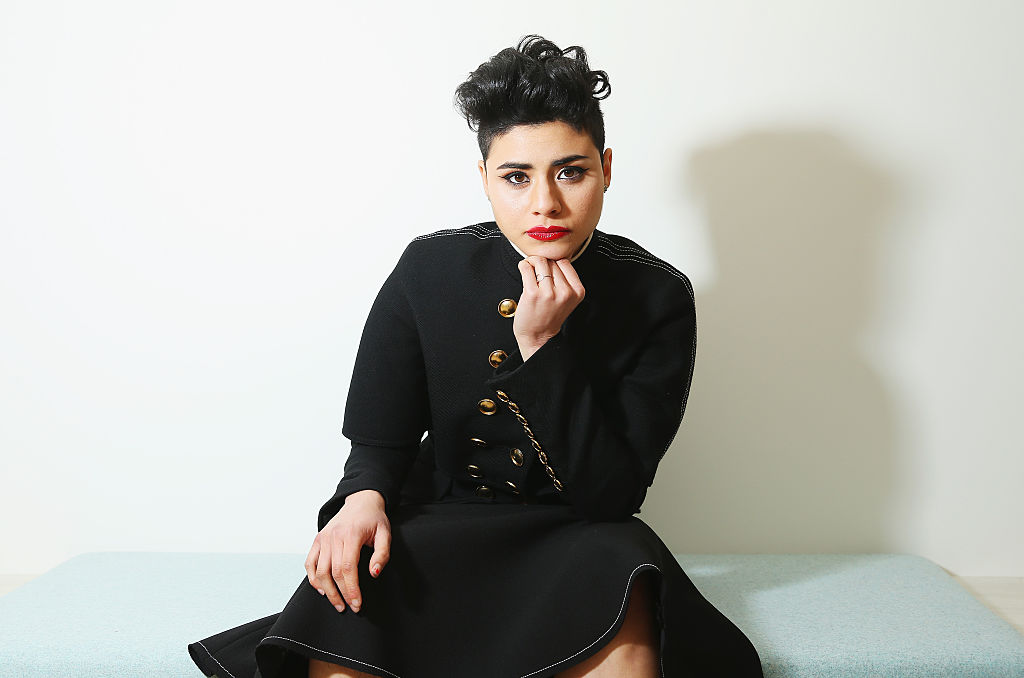When you have the opportunity to ask some of the most interesting people in the world about their lives, sometimes the most fascinating answers come from the simplest questions. The Thrive Questionnaire is an ongoing series that gives an intimate look inside the lives of some of the world’s most successful people.
Montaigne, the rising Australian singer-songwriter, has been getting plenty of buzz around her new single “Ready.” At 23-years-old, the Latinx artist has surpassed 8.5 million streams on her most popular track on Spotify, and won Best Breakthrough Artist at the ARIA Music Awards in 2016. Montaigne has established herself as one of Australia’s most distinctive new lyricists: in each of her songs, there is a deeper element and meaning. Now, the musician is gearing up for her newest album, Complex, which will be released on August 30.
In her Thrive Questionnaire, Montaigne shares how she manages the music industry as an introvert, her deepest thoughts on self-realization, and what brings her optimism and hope.
Thrive Global: Your new song “Ready” addresses the current climate crisis, and the feelings of anxiety surrounding it. Why is that so important today?
Montaigne: It’s important because progress doesn’t get made on an individual nor a societal/community level if we don’t acknowledge the tensions that are there. When one of the symbols on your car dashboard starts blinking you don’t just ignore it and hope it goes away. You acknowledge its existence and the fact that it is a consequential sign, and then you deal with it. It is much the same with the climate crisis. The anxiety is a huge, flashing neon sign signaling that action needs to be taken, so we better well take it.
TG: You have a new album coming out in August. It talks about self-realization among other things. How did you reach self-realization?
M: It does start with acknowledgment and awareness. Becoming cognizant of all my hang-ups and destructive tendencies was the springboard for me to launch into the long inquiry and experiment that was developing a healthy sense of self-worth. That was all born of an obsessive curiosity about how my brain works and an equally fervent obsession with the big question of how to live a good life and be a good person. The experiment entailed a lot of journaling, songwriting, conversations with friends (hello, Sally Rooney), therapy, and traveling. And before and during all of that, getting to my lowest point health-wise, both physically and mentally. I learned the lessons the hard way, as tends to be the case. Burnout is a terrible thing, but it did give me all of the tortuous free time to think. And friends. My closest friends have been my saviors.
TG: This industry can be really challenging and stressful. How do you manage that stress?
M: I do all the things that we’re told we should do, like regular therapy, journaling, mindfulness meditation, expressing myself artistically, exercising regularly, staying off my phone/laptop when I can, eating a plant-based diet, talking to friends, and reading lots. Not only does that stuff work, but it’s my favorite stuff to do. I’m an introvert. I don’t really get involved in industry stuff anymore unless it’s required of me. I don’t really go to gigs much except for comedy or symphonic performances or friends’ shows and I only go to events that are compulsory for me to attend. It’s just that industry events mostly take place at night time and in loud and busy venues where there’s lots of alcohol and so many stimuli. As an introvert, that’s my least favorite place to be. I find it really overwhelming and impossible to be present with whatever I’m trying to focus on. I think it’s much better for me to talk to my friends and colleagues, industry or otherwise, in quieter, calmer places. Additionally, I certainly used to think I needed to know or be chummy with certain people or be seen in certain places in order to be valid as an artist or a “successful” person but I think all of that is so sad now. It makes me feel sad that people who aren’t able to be in the “right” places or with the “right” people don’t feel like they’re good enough or doing well enough. It’s a deep, sociocultural issue which isn’t unique to music. I try not to be near spaces that emanate that kind of weird, social energy. I know this is a privileged position to take — I definitely put myself out there a lot earlier in my career. But now that it’s no longer imperative for me to do that, I take advantage of the luxury of keeping to myself. I’m not anti-social, just social in a different way than the industry dictates.
TG: Have you ever felt like giving up? What did you do?
M: I haven’t ever seriously considered giving up, but I definitely get very anxious sometimes. I have struggled deeply with being a public person, especially because of body image issues and the feeling that my personality is defective. I don’t believe those things anymore and have cultivated a healthy and loving inner voice. Now my fears are mostly about losing privacy, and maybe a little bit of safety, by being widely known by people who live near me. But you know, I’m tough, resilient, good at practicing self-care and erecting boundaries, and I’m a good runner, so —
I’ll be fine.
TG: Tell us about your relationship with your phone. Does it sleep with you?
M: No no no no no. I definitely used to and I hated it. It made me feel soul-sick. I read Cal Newport’s book Digital Minimalism and that gave me the framework to be able to get out of the addictive mire. If I am excited by or engaged with a conversation I’m having with someone over text late at night, I’ll allow myself to stay tuned to it, but after that’s all done it gets put away over across the room. Sometimes I will listen to my favorite podcast My Brother, My Brother and Me as I’m going to sleep if I need comfort. There are still times where I get sucked in, especially when I’m traveling since there’s so much time to kill. But I’m better now at catching myself in the loop, turning it off, and reading a book or writing instead.
TG: Share a quote that you love and that gives you strength or peace.
M: “Being deeply loved by someone gives you strength while loving someone deeply gives you courage.” – Lao Tzu
TG: How do you find time for yourself?
M: I make it! I mean, it’s not exactly hard to do, doing the job I do. I am given time on a silver platter. It is the biggest gift and privilege of the whole thing. I have almost all the time in the world to find myself and then find everyone else.
TG: Name a book that changed your life.
M: Atomic Habits by James Clear! I used to be a serial overdoer — too much too quickly — and that book taught me that incremental but consistent progress is not only enough, but it’s more effective than immediately intense and laborious work. The principles in the book have allowed me to consistently practice things that are really important to me and prevent me from burning out which I had huge problems with before. I now learn smart rather than hard, with patience and gentleness and again, consistency, and that’s been a wonder for my health in all regards, as well as to the development of my skills across all domains of my life.
TG: When was the last time you felt you failed and how did you overcome it?
M: I recently had a sort of confrontation with a friend I really love and I didn’t approach it very well initially. I was feeling hurt and angry and closed off to her feelings and experience and so responded to her fairly reactively. I really thought I was being fair at the time too but a few days later, I’d realized I’d been harsh. I talked to my therapist about why my reaction had been so severe, and talked to another friend about how to see it from her perspective, and that helped put me back in my place in a good way. Humbling and good. The relationship is fractured in a way that I’m hoping can be repaired someday but I did hurt this person really badly. I was at fault but I’m in a place psychologically where I understand that I am not a bad or defective person, I just did a bad thing, and I can use the guilt I feel to try and do better next time (thanks Brené Brown for all the help).
TG: What brings you optimism and hope?
M: My friends! Reading! All the people out there trying to help others, other living things, and the planet. I find podcasts like This American Life or Radiolab provide pretty inspiring stories about human cooperation which always restore my faith in humanity. Also, Alexandria Ocasio-Cortez.
TG: How do you show gratitude?
M: By being an attentive, open, loving friend and artist. By being someone who’s carefully considered their values and follows through in living by them. Taking only what I need and no more than that. I hope that comes across.
TG: How do you prioritize when you have an overwhelming amount to do?
M: I haven’t been in that “overwhelming amount to do” position for a long while now. I guess I’d use that model of prioritizing in order of 1.urgent/important 2. urgent/unimportant 3. non-urgent/important 4. non-urgent/unimportant. The thing is though, I am indeed my own boss so I get to say yes and no to doing things as I like. My management/label can insist that something would be a very good opportunity so I really should do it, but at the end of the day, I get the final say. I’ve gotten pretty good at saying no to things that either 1. Are good opportunities but aren’t really important to me and 2. Are indeed important or exciting to me but the timing would lay me waste either emotionally or energetically. My health is more important to me because I need it to do the things I’m being asked to do. Again, a position of privilege and I didn’t always feel like that. The book Tribe of Mentors by Tim Ferriss really helped me with getting comfortable with saying no respectfully. I’d also like to clarify that I am not above being stressed! I still get stressed, but I’m good at treating and managing the stress itself as well as the situation causing it.
Follow us here and subscribe here for all the latest news on how you can keep Thriving.
Stay up to date or catch-up on all our podcasts with Arianna Huffington


